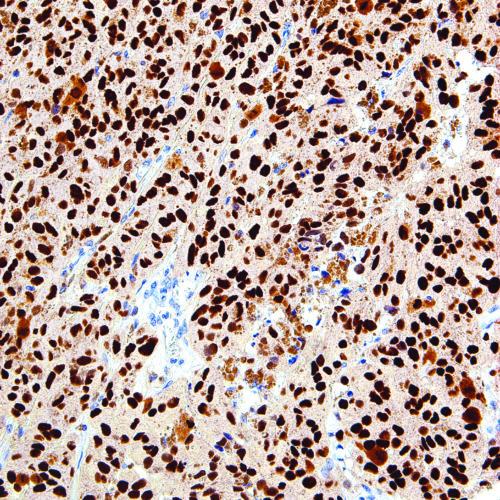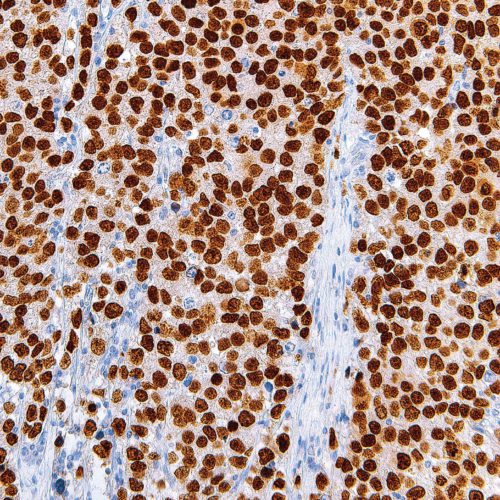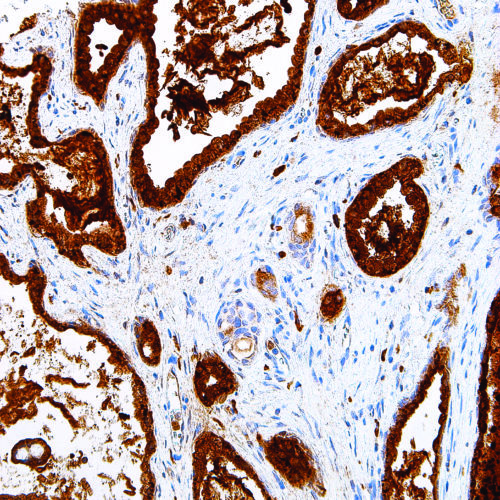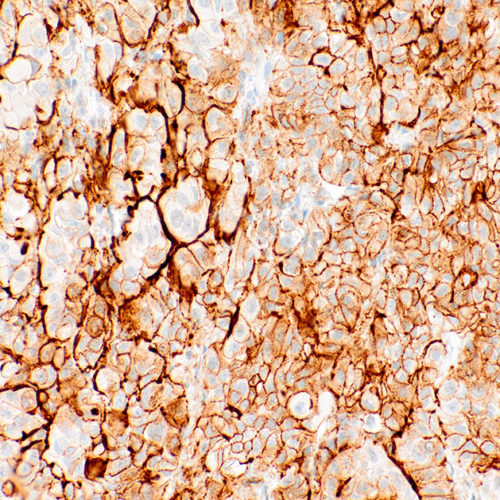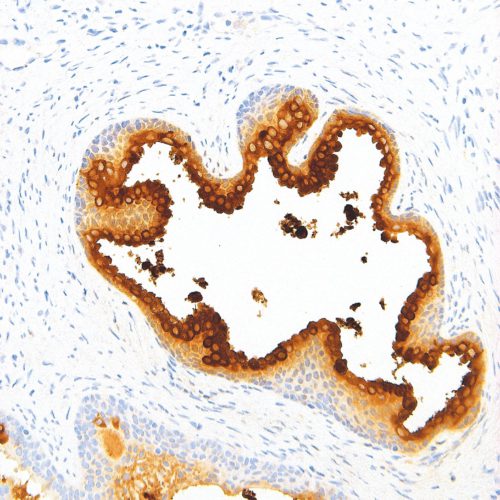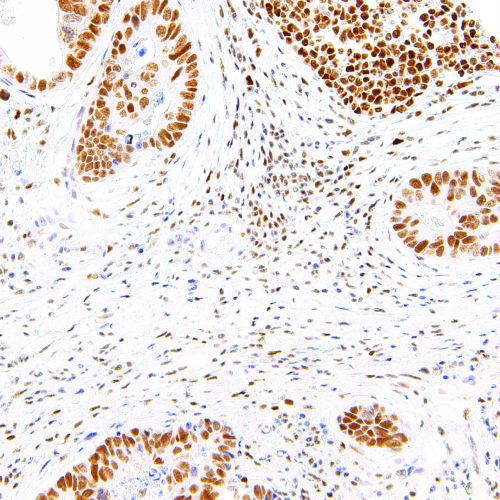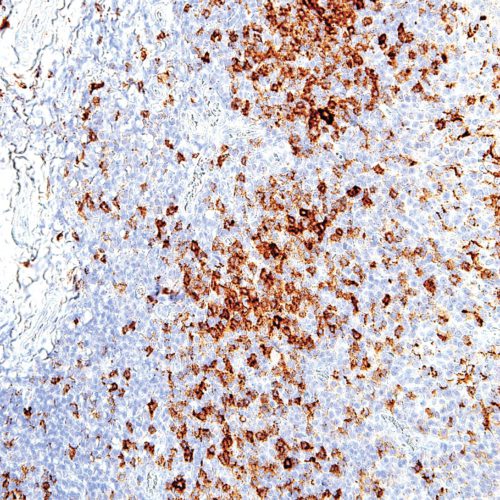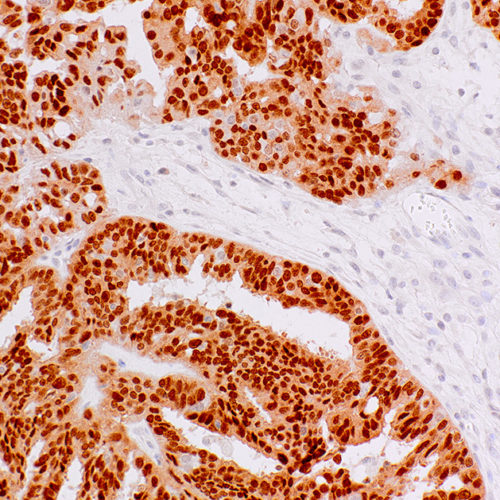High quality products to support Pathologists and Biological and Environmental Scientists
GeneAb™ SOX10
$107.50 – $446.12SRY (Sex Determining Region Y)-Box 10 (SOX-10), also known as transcription factor SOX-10, is a nuclear transcription factor that acts in regulation of embryonic development and in the specification and differentiation of cells of melanocytic lineage. SOX-10 is diffusely expressed in neurofibromas and schwannomas, and mutations in the SOX-10 gene are linked to Waardenburg-Shah and Waardenburg-Hirschsprung disease. Anti-SOX-10 has been shown to be sensitive for conventional, spindled, and desmoplastic melanoma, and has been used to detect metastatic melanoma and nodal capsular nevus in sentinel lymph nodes.
GeneAb™ SALL4
$80.62 – $354.75Sal-Like Protein 4 (SALL4), is a zinc finger transcription factor found in germ cells and human blood progenitor cells, with functional involvement in modulating Oct-4 to maintain embryonic stem cell pluripotency. SALL4 is a useful marker for acute myeloid leukemia, B-cell acute lymphocytic leukemia, intratubular germ cell neoplasia, seminomas/dysgerminomas, and yolk sac tumors (both pediatric and postpubertal). Anti-SALL4 is used to detect embryonal carcinomas, hepatocellular carcinoma (HCC), gliomas, ovarian primitive germ-cell tumors, choriocarcinomas, spermatogonia, teratoma, gastric cancer, breast cancer, and lung cancer. Expression of SALL4 is often associated with poor prognosis in HCC, and with metastasis in endometrial cancer, colorectal carcinoma, and esophageal squamous cell carcinoma.
GeneAb™ PSAP
$59.12 – $225.75Prostatic Specific Acid Phosphatase (PSAP) is a prostatic enzyme found in the glandular epithelium of the prostate. PSAP levels are elevated in hyperplastic prostate and prostate carcinoma, with the highest levels being detected in metastasized prostate cancer. Moderate overexpression of PSAP is also characteristic of diseases of the bone (such as Paget’s disease or hyperparathyroidism), diseases of blood cells (such as sickle-cell disease), multiple myeloma, or lysosomal storage diseases (such as Gaucher’s disease). PSAP is considered more sensitive, yet less specific, than PSA, however Anti-PSAP can act as a useful complement to Anti-PSA under suitable clinical contexts.
GeneAb™ Podoplanin
$91.38 – $526.75Podoplanin is a transmembrane mucoprotein specifically expressed in the endothelium of lymphatic capillaries, while remaining absent from the blood vasculature. The protein is co-localized with VEGFR3/FLT4 in normal skin and kidney. Anti-Podoplanin is useful in the identification of lymphangiomas, Kaposi’s sarcomas, epithelioid mesotheliomas, hemangioblastomas, seminomas, and some angiosarcomas which likely have lymphatic differentiation.
GeneAb™ PSA
$75.25 – $301.00Prostate-Specific Antigen (PSA) is a serine protease of the kallikrein family, that is produced by the prostate epithelium and epithelial lining of the periurethral glands. Although considered prostate-specific, PSA has also been detected in breast tissue, breast tumors, endometrium, adrenal neoplasms, and renal cell carcinomas. Anti-PSA can be used for differentiating high-grade prostate adenocarcinoma from high-grade urothelial carcinoma, as well as for determining the prostatic origin of carcinomas in non-prostate tissues. Anti-PSA recognizes primary and metastatic prostatic neoplasms, but not tumors of nonprostatic origin, and can be useful as an aid to confirm prostatic acinar cell origin in primary and metastatic carcinomas.
GeneAb™ PMS2
$75.25 – $430.00Postmeiotic Segregation Increased 2 (PMS2) is a DNA repair protein involved in mismatch repair. Mutations and deficiencies in the PMS2 gene have been linked to microsatellite instability, and malignancies such as hereditary nonpolyposis colorectal cancer and endometrial cancer. Expression levels of the PMS2 protein may be useful as a screening tool for Lynch syndrome after a colorectal cancer diagnosis. Anti-PMS2 is recommended to be used as part of a panel along with antibodies against MLH1, MSH2, and MSH6.
GeneAb™ PD-1
$75.25 – $301.00Programmed Death 1 (PD-1) is a member of the CD28/CTLA-4 family of T-cell regulators, expressed as a co-receptor on the surface of activated T-cells, B-cells, and macrophages. New studies have suggested that the PD-1/PD-L1 signaling pathway may be linked to anti-tumor immunity, as PD-L1 has been shown to induce apoptosis of activated T cells or inhibit activity of cytotoxic T cells. In comparison to CD10 and Bcl-6, PD-1 is expressed by fewer B cells and has therefore been considered a more specific and useful diagnostic marker for angioimmunoblastic T-cell lymphoma. Therapies targeted toward the PD-1 receptor have shown remarkable clinical responses in patients with various types of cancer, including non–small-cell lung cancer, melanoma, and renal-cell cancer.
GeneAb™ PAX-8
$161.25 – $838.50PAX-8 is a member of the paired box (PAX) family of transcription factors, which are key regulators in early development. This protein plays a role in development of thyroid follicular cells and the expression of thyroid-specific genes, with mutations in the PAX-8 gene linked to thyroid follicular carcinomas, atypical thyroid adenomas, and thyroid dysgenesis. The PAX-8 protein is expressed in simple ovarian inclusion cysts and non-ciliated mucosal cells of the fallopian tubes, but is absent from normal ovarian surface epithelial cells. PAX-8 is also not expressed in normal lung or lung carcinomas. Reports have associated PAX-8 expression with renal carcinoma, nephroblastoma, and seminoma, and have indicated PAX-8 as a useful marker for renal epithelial tumors, ovarian cancer, and for differential diagnoses in lung and neck tumors. Anti-PAX-8 can be useful in determining the primary site of invasive micropapillary carcinomas of ovary from bladder, lung, and breast, when used in adjunct with a panel of organ-specific markers such as uroplakin, mammaglobin, and TTF-1.
